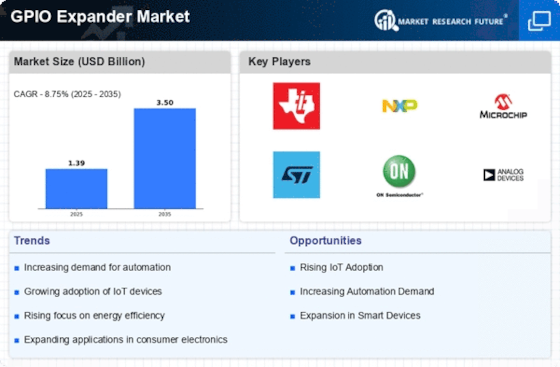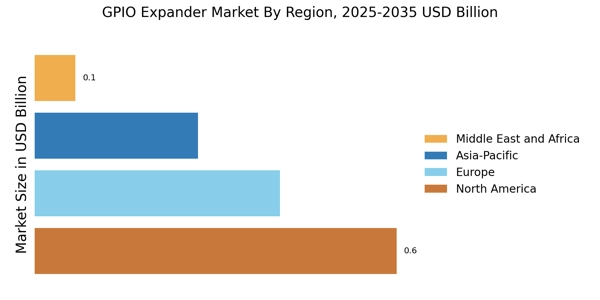Rising Focus on Energy Efficiency
The rising focus on energy efficiency is increasingly shaping the GPIO Expander Market. As organizations and consumers become more environmentally conscious, there is a growing demand for electronic components that minimize energy consumption. GPIO expanders, particularly those designed for low-power applications, are becoming essential in this context. The energy-efficient electronics market is projected to grow significantly, with a focus on reducing carbon footprints and operational costs. This trend suggests that manufacturers of GPIO expanders may need to prioritize energy-efficient designs to remain competitive. Furthermore, the integration of GPIO expanders in energy-efficient systems can enhance overall performance, making them a vital component in the push towards sustainability. The GPIO Expander Market appears well-positioned to capitalize on this increasing emphasis on energy efficiency.
Increasing Adoption of Smart Devices
The increasing adoption of smart devices is a pivotal driver for the GPIO Expander Market. As consumers and businesses alike embrace smart technology, the demand for GPIO expanders, which facilitate the connection of multiple peripherals, is likely to surge. In 2025, the market for smart home devices is projected to reach approximately 100 billion USD, indicating a robust growth trajectory. This trend suggests that manufacturers of GPIO expanders must innovate to meet the evolving needs of smart device integration. Furthermore, the proliferation of smart wearables and IoT applications necessitates efficient GPIO management, thereby enhancing the relevance of GPIO expanders in various electronic systems. The GPIO Expander Market appears poised for substantial growth as it aligns with the broader trend of digital transformation across sectors.
Technological Advancements in Electronics
Technological advancements in electronics are significantly influencing the GPIO Expander Market. Innovations in semiconductor technology and circuit design have led to the development of more efficient and compact GPIO expanders. For instance, the introduction of low-power GPIO expanders has enabled their use in battery-operated devices, which is crucial for the expanding market of portable electronics. The market for semiconductors is expected to grow at a compound annual growth rate of around 5% through 2025, which may further bolster the GPIO expander segment. These advancements not only enhance performance but also reduce costs, making GPIO expanders more accessible to a wider range of applications. As technology continues to evolve, the GPIO Expander Market is likely to benefit from ongoing innovations that improve functionality and efficiency.
Growing Demand for Automation in Industries
The growing demand for automation across various industries serves as a significant driver for the GPIO Expander Market. Industries such as manufacturing, automotive, and healthcare are increasingly adopting automated systems to enhance efficiency and reduce operational costs. The automation market is projected to reach over 300 billion USD by 2025, indicating a strong trend towards integrating advanced control systems. GPIO expanders play a crucial role in these systems by enabling the connection of multiple sensors and actuators, thereby facilitating seamless automation. This trend suggests that the GPIO Expander Market will likely experience heightened demand as industries seek to implement more sophisticated automation solutions. The ability of GPIO expanders to support diverse applications makes them indispensable in the automation landscape.
Expansion of the Automotive Electronics Sector
The expansion of the automotive electronics sector is a notable driver for the GPIO Expander Market. With the rise of electric vehicles and advanced driver-assistance systems, the need for efficient electronic components has never been greater. The automotive electronics market is anticipated to exceed 400 billion USD by 2025, reflecting a growing reliance on sophisticated electronic systems. GPIO expanders are essential in managing the numerous electronic functions within vehicles, from infotainment systems to safety features. This trend indicates that manufacturers of GPIO expanders must adapt to the specific requirements of the automotive sector, potentially leading to innovations tailored for automotive applications. As the automotive industry continues to evolve, the GPIO Expander Market is likely to benefit from this expansion.














